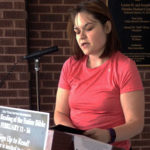- The Explore the Bible lesson for Oct. 6 focuses on Ephesians 3:14-21.
Like a glove without a hand in it, a life without the moving and working of the Holy Spirit is not fulfilling the purpose for which it was created. In Ephesians 3:14-21, the Apostle Paul is either revisiting the prayer that he began in chapter 1 or is bringing the same prayer to its conclusion. His concluding words within his prayer here contain a desire that the Ephesians experience the empowering work of God, through the infilling of the Holy Spirit.
Paul makes this request in three stanzas—the request to the Father for the Spirit, the expression of what that indwelling looks like and means, and praise to God for his capacity to do even more than we ask. Through looking at this petition, we gain insight into the impact we can have for our fellow believers as we, likewise, lift them up in prayer.
Petitioned (Ephesians 3:14-15)
While kneeling is one of the common positions Christians take in prayer, its use in this context may be to illustrate a posture of his recognition of God’s grandeur that he will verbalize throughout this passage. That is, Paul is not just taking a posture of prayer; he is bowing before a sovereign whose glory will one day cause every knee to bow.
In his prayer, Paul acknowledges this sovereign as Father. This description of God is among the most used descriptions throughout the New Testament. Sometimes it is used to highlight a sense of intimacy between the believer and her God. Sometimes it is used to communicate the special status of Christ the Son with the Father. But in this particular context it is used to express the greatness of God as the cosmic ruler and progenitor of all creation.
Throughout the letter, Paul emphasizes that the Son is at the center of all and will bring all things together. It is only natural then that he points out the Father as the source of all things as he begins to highlight God’s purposes and to call us to acknowledge our place in relationship to him.
How does viewing God as Father help us in our walk? How is his role as cosmic Father described in this passage different from his role as intimate Father in others? How is it the same?
Indwelled (Ephesians 3:16-19)
The centerpiece of Paul’s prayer and his concern for his readers is expressed in these verses. He wants them to be empowered by the indwelling of the Holy Spirit, manifested by the presence of Christ living within us. Earlier Paul stated that the church was where God lives by the Spirit (Ephesians 2:20-22). Now he wants us to see that individually we can have Jesus dwell in us by that same Spirit.
Although it is tempting see Paul as making several requests in this passage, it really is just one request—the indwelling of Christ. All the other aspects of the prayer (strength, love, power, knowledge) are merely manifestations of this one reality. Indeed, this prayer is the basis for all the ethical expectations that follow in the remainder of the letter. The indwelling of Christ is the well-spring from which our transformation takes place and we accomplish all that we called to.
This indwelling and the accompanying results are all an outgrowth of the deep love Christ has for humanity. Though there is no object in the original Greek at the end of the listed dimensions in verse 18, the NIV is likely correct to provide “the love of Christ” as the object in light of verse 19. This selfless expression of Christ is both the impetus and goal of our relationship with him. Love begets love which is the power that brings real change.
Sign up for our weekly edition and get all our headlines in your inbox on Thursdays
How would you describe the interplay between power and love as expressed in this passage? What are some specific examples you can list of how that interaction can be experienced and expressed?
Honored (Ephesians 3:20-21)
The wonder of all that God has done can only end in one place—worship. Paul concludes his prayer with a doxology Whether it is the spectacle of the work that God did through the incarnation of the Son, the thoroughness of transformation that believers enjoy through the indwelling of Christ or the depth of love that God has expressed to all humanity, God is truly worthy of worship.
What is interesting about this doxology is that Paul uniquely includes the concept that God’s glory is manifested in the church as well as in Christ. The idea is not an equal status between the church and Christ, but that the church is a great (perhaps the greatest) demonstration of the glory of God. The relationship that was seemingly irreparably broken at the fall has been repaired. People from every tribe are living testimonies to the greatness of God, testimonies that will continue to be expressed throughout eternity.
While Paul’s expression of worship is found in the expression of a doxology, what are some ways that we can worship God for what he has done outside of the context of verbal praise?
Timothy Pierce, Ph.D., is assistant professor of religion at East Texas Baptist University.














We seek to connect God’s story and God’s people around the world. To learn more about God’s story, click here.
Send comments and feedback to Eric Black, our editor. For comments to be published, please specify “letter to the editor.” Maximum length for publication is 300 words.